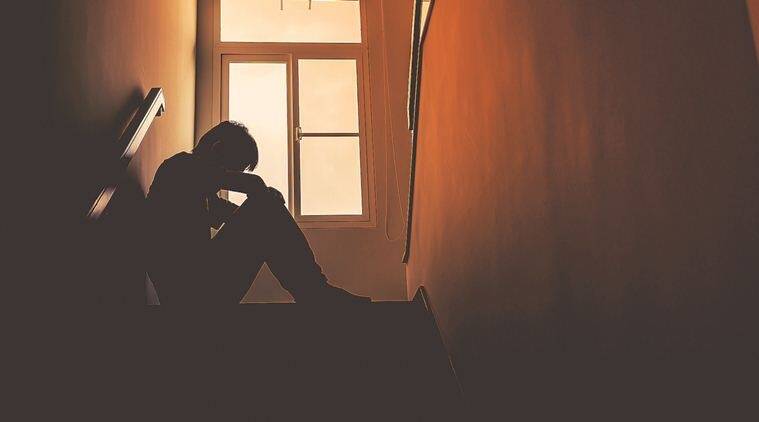Inside Srinagar’s district court complex, the scenes are exploding with emotions.
A handcuffed son brought for hearing is consoling his mother. In the bleak backyard, two sisters are pleading the case of their incarcerated brother with an advocate. A hunchbacked father has also arrived to make sense of the charges slapped on his son.
In this emotive environment, Shahida Khanum, 26, looks at the cloudy sky from her chamber. It’s been four years since she’s practicing law and battling insomnia.
“I cannot sleep,” she talks with a strange disarming body language. “An unusual anxiety terrifies me as the darkness gets grave.”
When twilights initially turned tense for her, she failed to trace the trigger, until she visited a physician who referred her to a psychologist.
“When my psychologist asked hundreds of questions in several sessions, I understood that witnessing people booked under laws and not able to provide justice is my cause of sleeplessness.”
Inside the ‘stigmatized’ structure of Psychiatric Hospital in Badamwari area of Srinagar, Dr. Shabir Ahmad sits to explain the young lawyer’s case.
“What people tend to confuse as a state of sleeplessness is actually a growing sign of mental mess in Kashmir,” the psychiatrist said.
“If a population is living in an ongoing conflict and the external environment incorporating different sectors like culture, business, education or overall life gets affected and involved, a community can be collectively depressed.”
A few years back, Dr. Shabir shared an anecdote as an example, he and two other Kashmiris jumped with fear upon hearing a loud noise in a crowded Mumbai café.
“There,” he said, “I understood that Kashmiri people have a collective psychology of fear. We’re used to shudder with grenade explosions, attacks and so on, whereas others are not.”
To deal with this distress, the 80-lakh strong community often takes penance in pills.
.jpg)
Fifty-year-old Mohammad Shafi has been spending more on medicines than his merchandise for years now.
His family of four, including his wife Shameema (42), daughters Mehreen (27) and Sehreen (24), devours daily doses for different diseases.
While the headman suffers from Hypertension, the mother has Diabetes and their daughters have PCOS (Polycystic Ovary Syndrome).
As per the Indian Council of Medical Research (ICMR), Kashmir has the highest PCOS prevalence in the world.
“The doctors have warned us against diabetes due to our mother’s disease profile,” said Mehreen.
“To control PCOS, we (sisters) have been prescribed metformin medicines, also given to diabetic patients. I worry if these medicines would affect my kidneys. The prolonged use of this drug impaired my grandfather’s kidneys and resulted in his death.”
The siblings have different medicine containers and it feels sickening when they take medicines before and after eating and sleeping.

These common household cases only indicate that Kashmir’s appetite for medicines is only growing and somehow linked with the prevailing pathos in the valley.
“While 75 percent of the Kashmir population has mental disorders, the reality is almost 3 out of 5 persons in a family are taking medicines in Kashmir,” says a study by Institute of Mental Health and Neurosciences, Srinagar.
Between July 20 and August 23, 2019, when Kashmir was under the barrage of unsettling rumours and communication clampdown, medicines worth Rs 32 crore were supplied to the valley.
Three Covid lockdown years since then have only surged supplies and stocks, especially pills for pandemic.
While fresh figures are still a work in progress, Dr. Salim Khan, Head of the Community Medicines, SMHS, links the massive medicine intake with the distressed mindscape.
“Sadly, for many mental health disorders, like hair loss, fatigue, shortness of breath, we prescribe general medicines,” Dr. Khan said. “But actually, these issues are there due to mental instability taking a toll on physical attributions.”
That’s why in Kashmir, said Dr. Junaid Nabi, a mental health specialist, anxiety and depression create hormonal imbalance and cause PCOS in young women and hypothyroidism in young men.
Current researches even reveal that physical health problems like Irritable Bowel Syndrome, Constipation or Indigestion are prevalent in people due to different mental health issues.
“I’ve personally seen improvements when I prescribed anti-depressants to patients who have chronic ailments like uncontrolled diabetes and hypertension because mental and physical health are interrelated and we cannot separate them,” Dr. Junaid. “It’s like body and soul.”

To maintain the right balance between his “body and soul”, Abid, a 22-year-old boy from South Kashmir’s Anantnag district, takes medicines empty stomach early in the morning.
If he skips medicine for even a day, he feels like vomiting everything.
Abid’s stomach complications started during the clampdown of 2019 when like others, he spent five months inside the four-walls of his home without any connectivity.
“But one day,” he said, “I felt like walking on the road. So, I asked a few friends to join me and we went outside. But as we passed through a military camp, we were stopped and frisked. I was told to trim my beard and hair. I didn’t want to do that as it’s a personal choice but then we live in Kashmir where we actually have no choice. That dictate is still disturbing me.”
Dr. Junaid terms such conflicting experiences as the catalysts for the mental crisis.
But despite these lived traumatic experiences, he said, people in Kashmir still feel uneasy to talk about their mental health.
“If you suggest someone to consult a psychologist or psychiatrist, s/he would possibly answer: ‘Wait, did you just call me mad? How dare you?’ And it is the biggest hindrance that prevents people to consult mental specialists here,” Dr. Junaid said.
“The mental trauma is an invisible wound with an invisible pain. You need a specialist to fix it. Even today one of my female patients told me that only I understand her pain because mental health problems are hidden. It’s not a bone fracture that you can show reports to your family and friends, so they would sympathize. It doesn’t work that way. We need to talk about it. Seeking support is not a shame!”

Mindful of the mental health importance now, Shahida Khanum still feels that “invisible pain” while attending the court every day.
She often comes back home with a seething sense and ends up losing her sleep.
“Such is the frequency and intensity of our troubles in Kashmir that at times even medicines don’t work,” she said. “Our perpetual pain is crippling us collectively.”